Exclusive 3:16 Interview with Karl Marx
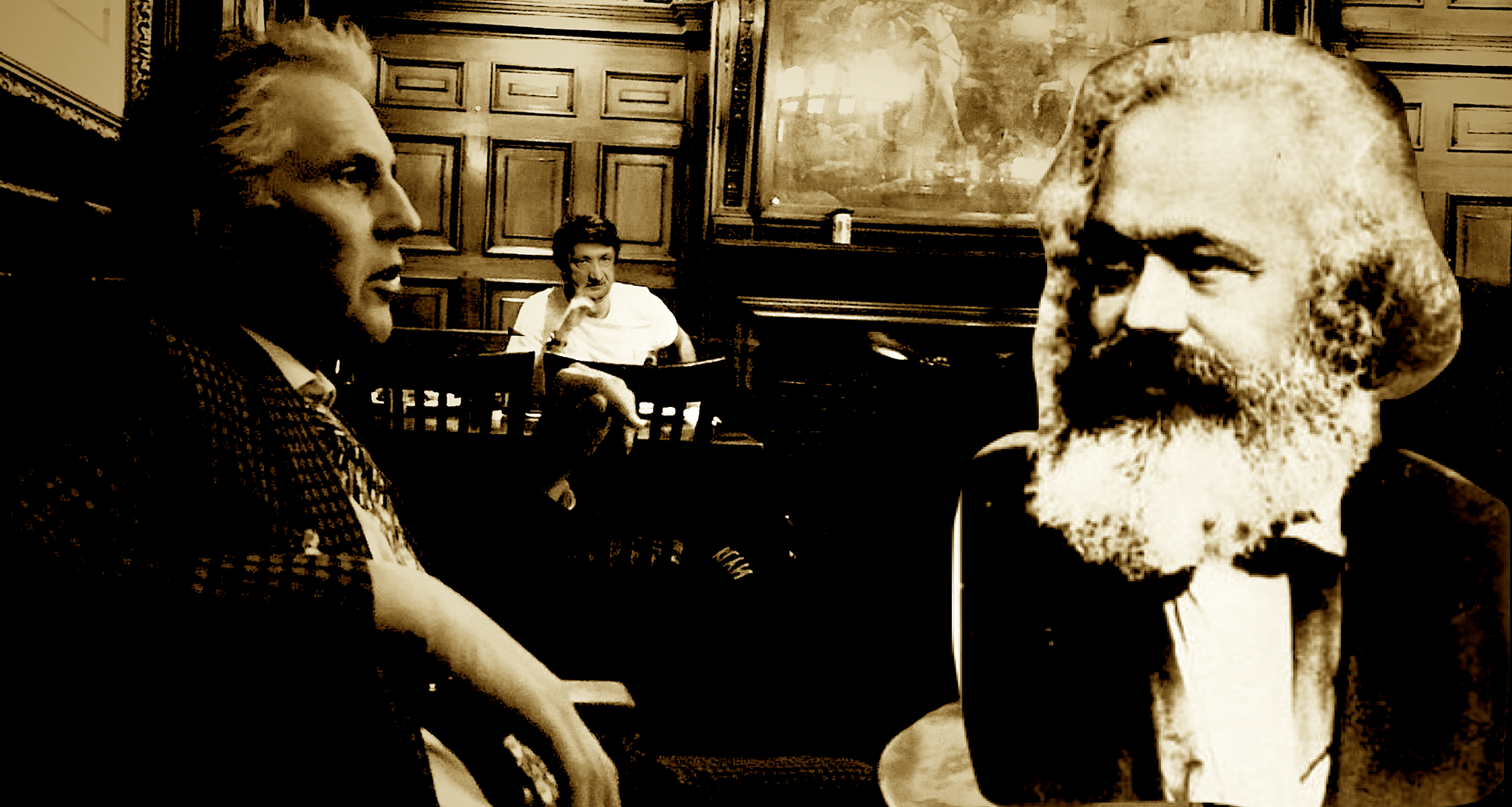
Interview by Richard Marshall
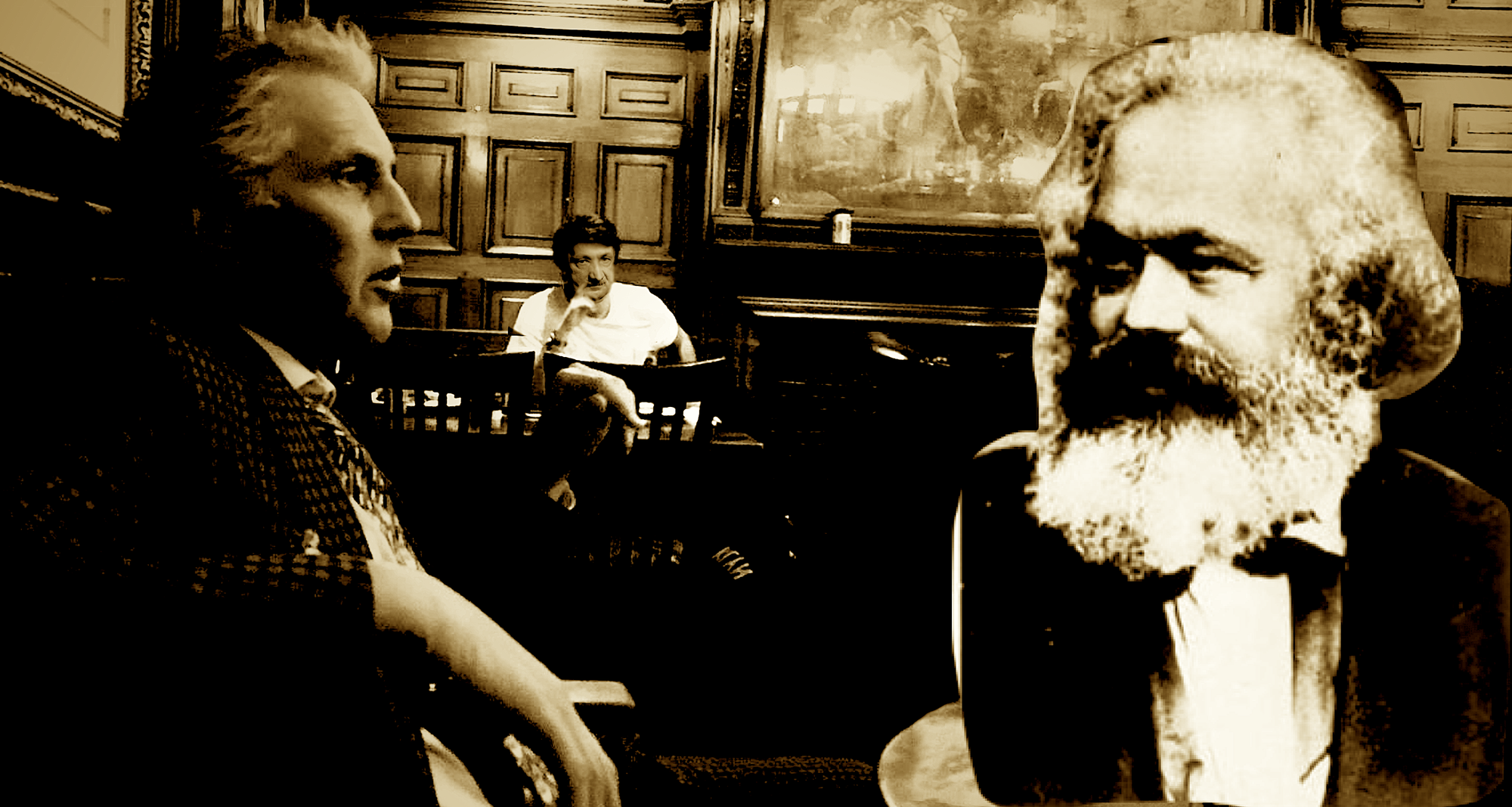
Karl Heinrich Marx is a German philosopher, critic of political economy, economist, historian, sociologist, political theorist, journalist and socialist revolutionary. Born in Trier, Germany, Marx studied law and philosophy at the universities of Bonn and Berlin. Due to his political publications, Marx is stateless and lives in exile with his wife and children in London , where he continues to develop his thought in collaboration with German thinker Friedrich Engels and publish his writings, researching in the British Museum Reading Room. The interview took place in a cafe in Dean Street, Soho.
3:16: What made you become a philosopher?
Karl Marx: I wish to avenge myself against the One who rules above. My object in life is to dethrone God and destroy capitalism. The task is not just to understand the world but to change it. To be frank, Richard, one has to leave philosophy aside, one has to leap out of it and devote oneself like an ordinary man to the study of actuality.
3:16: But does that necessarily preclude philosophy?
KM: Philosophy and the study of the actual world have the same relation to one another as masturbation and sexual love. But nevertheless Philosophy, as long as a drop of blood shall pulse in its world-subduing and absolutely free heart, will never grow tired of answering its adversaries with the cry of Epicurus: "Not the man who denies the gods worshiped by the multitude, but he who affirms of the gods what the multitude believes about them, is truly impious". Philosophy makes no secret of it. The confession of Prometheus: "In simple words, I hate the pack of gods" is its own confession, its own aphorism against all heavenly and earthly gods who do not acknowledge human self-consciousness as the highest divinity.
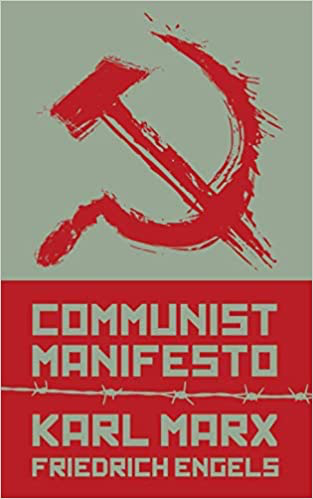
3:16: Wow! Strong mead Karl. So what was the general conclusion you drew from this starting point?
KM: I was led by my studies to the conclusion that legal relations as well as forms of State could neither be understood by themselves , nor explained by the so-called general progress of the human mind, but that they were rooted in the material conditions of life, which are summed up by Hegel after the fashion of the English and French writers of the eighteenth century under the name civil society, and that the anatomy of civil society is to be sought in political economy. It may be formulated briefly as follows Richard: in the social production which men carry on they enter into definite relations that are indispensible and independent of their will; these relations of production correspond to a definite stage of their material powers of production. The totality of these relations of production constitutes the economic structure of society – the real foundation , on which legal and political superstructures arise and to which definite forms of social consciousness correspond.
3:16: So there's a link between how we are organised socially and how we produce material things and what we think?
KM: The hand-mill gives you society with the feudal lord; the steam-mill society with the industrial capitalist. The same men who establish their social relations in conformity with the material productivity, produce also principles, ideas, and categories, in conformity with their social relations. Thus the ideas, these categories, are as little eternal as the relations they express. They are historical and transitory products. The production relations of every society form a whole.
3:16: So does everything – politics, society, ideas and ideologies all depend on these relations of production according to you? Is the economic the foundation of everything else?
KM: You better believe it Richard! The mode of production of material life determines the general character of the social, political and spiritual processes of life.
3:16: So you’re turning Hegel upside down and that's why you have a beef with philosophy - you're thinking of German idealist post-Kantian stuff culminating in Hegel??
KM: Exactly. It is not the consciousness of men that determines their being, but, on the contrary, their social being determines their consciousness. In direct contrast to German philosophy, which descends from heaven to earth, here we ascend from earth to heaven. That is to say we do not set out from what men say, imagine, or conceive, nor from what has been said, thought, imagined, or conceived of men, in order to arrive at men in the flesh. We begin with real, active men and from their real life-process show the development of the ideological reflexes and echoes of this life-process. The phantoms of the human brain are necessary sublimates of men’s material life-process which can be empirically established and which is bound to material preconditions.
Life is not determined by consciousness, but consciousness by life. Morality, religion, metaphysics, and other ideologies and their corresponding forms of consciousness no longer retain their appearance of autonomous existence. They have no history, no development; it is men who in developing their material production and their material intercourse change, along with their real existence their thinking and the products of their thinking.
3:16: Wild. You continue to use the dialectical logic of Hegel though don’t you?
KM: Yes. So, at a certain stage of their development the material forces of production in society come in conflict with the existing relations of production or – what is but a legal expression for the same thing – with the property relations within which they had been at work before. From forms of development of the forces of production these relations turn into their fetters. Then occurs a period of social revolution.
3:16: And once the economic foundation changes, everything else changes too?
KM: You’ve got it right. With the change of the economic foundation the entire immense superstructure is more or less rapidly transformed.
3:16: And what you think we need to keep our eyes on are the contradictions within material life – not the legal, political, religious, aesthetic or philosophical ideas floating around at the time which is what we usually do?
KM: That’s very important. Just as our opinion of an individual is not based on what he thinks of himself, so we cannot judge of such a period of transformation by its own consciousness; on the contrary, this consciousness must rather be explained from the contradictions of material life, from the existing conflict between the social forces of production and the relations of production.
3:16: So is history best thought of as a successive progress through different economic formations?
KM: Oh yes Richard. In broad outline we can designate the Asiatic, the ancient, the feudal and the modern bourgeois modes of production as progressive epochs in the economic formation of society.
3:16: And we’re in the bourgeois stage right now yes?
KM: DUH! We are Richard. The bourgeois relations of production are the last antagonistic form of social process of production; not in the sense of individual antagonisms, but of conflict arising from conditions surrounding the life of individuals in society.
3:16: And when the conflicts get bad enough this stage will end?
KM: Well, what I say is that the productive forces developing in the womb of bourgeois society create the material conditions for the solution of that antagonism. With this social formation, therefore, the prehistory of human society comes to an end.
3:16: And then comes Socialism yes?
KM: Yes.
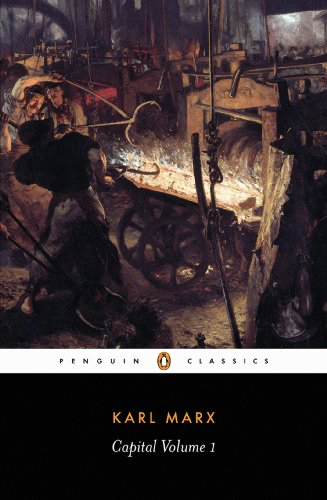
3:16: So it was an error of timing for Lenin, Mao and other Marxists to try and bring about Communism at the start of the twentieth century, because Communism can’t emerge until the contradictions of bourgeois society have fully played out? So those so-called Marxist communist revolutions weren't actually communist?
KM: Well Richard, first, I’m no Marxist. Secondly, the working class cannot simply lay hold of the ready-made state machinery, and wield it for its own purposes. Right can never be higher than the economic structure of society and its cultural development conditioned thereby.
3:16: So yours is a materialist conception of history?
KM: Yes it is Richard. The premises from which we began are real premises; they are the real individuals, their activity and their material conditions of life, including those which they find already in existence and those produced by their activity. These premises can thus be established in a purely empirical way. The first presumption of all human existence and therefore of all history is that man must be in a position to live, life involves eating and drinking, a habitation, clothing and many other things, the production of material life itself, which is a fundamental condition of all history. The history of humanity must always be studied and treated in relation to the history of industry and exchange. The materialist conception of history starts from the proposition that the production of the means to support human life and, next to production, the exchange of things produced, is the basis of all social structure; that in every society that has appeared in history, the manner in which wealth is distributed and society divided into classes or orders is dependent upon what is produced, how it is produced, and how the products are exchanged. From this point of view, the final causes of all social changes and political revolutions are to be sought, not in men’s brains, not in men’s better insights into eternal truth and justice, but in changes in the modes of production and exchange.
3:16: Is yours a new version of materialism?
KM: Yes.The main defect of all hitherto-existing materialism — that of Feuerbach included — is that the Object, actuality, sensuousness, are conceived only in the form of the object , or of contemplation , but not as human sensuous activity, Praxis, not subjectively. Hence it happened that the active side, in opposition to materialism, was developed by idealism — but only abstractly, since, of course, idealism does not know real, sensuous activity as such. Feuerbach wants sensuous objects, differentiated from thought-objects, but he does not conceive human activity itself as objective activity.
3:16: And this is also an empirical, scientific approach?
KM: Of course it is Richard. The first premise of all human history is the existence of living human individuals. The first fact to be established is the physical constitution of these individuals and their relation to Nature. Men can be distinguished from animals by anything one likes. They themselves begin to distinguish themselves from animals as soon as they begin to produce their means of subsistence, producing their actual material life. Natural science will in time incorporate into itself the science of man, just as the science of man will incorporate into itself natural science: there will be one science. Natural science has invaded and transformed human life all the more practically through the medium of industry; and has prepared human emancipation, although its immediate effect had to be the furthering of the dehumanisation of man. Industry is the actual, historical relationship of nature, The nature which develops in human history — the genesis of human society — is man’s real nature; hence nature as it develops through industry, even though in an estranged form, is true anthropological nature.
3:16: And this is because mankind is a part of material nature?
KM: Too right. This is all possible because Man is directly a natural being. As a natural being and as a living natural being he is on the one hand endowed with natural powers, vital powers — he is an active natural being. These forces exist in him as tendencies and abilities — as instincts. On the other hand, as a natural, corporeal, sensuous objective being he is a suffering, conditioned and limited creature, like animals and plants. A being which does not have its nature outside itself is not a natural being, and plays no part in the system of nature. A being which has no object outside itself is not an objective being.
3:16: Is science then always history for you?
KM: Good question Richard. Yes, we know only a single science, the science of history. One can look at history from two sides and divide it into the history of nature and the history of men. The two sides are, however, inseparable; the history of nature and the history of men are dependent on each other so long as men exist. The history of nature, called natural science, does not concern us here; but we will have to examine the history of men, since almost the whole ideology amounts either to a distorted conception of this history or to a complete abstraction from it. Ideology is itself only one of the aspects of this history.
3:16: Is Darwin’s theory of evolution important to you?
KM: Human anatomy contains a key to the anatomy of the ape. ‘On the Origin of Species’ contains the basis in natural history for our view. The whole Darwinian theory of the struggle for existence is simply the transference from society to animate nature of Hobbes’ theory of the war of every man against every man and the bourgeois economic theory of competition, along with the Malthusian theory of population. This feat having been accomplished the same theories are next transferred back again from organic nature to history and their validity as eternal laws of human society declared to have been proved. Darwin’s work is most important and suits my purpose in that it provides a basis in natural science for the historical class struggle. Despite all shortcomings, it is here that, for the first time, “teleology” in natural science is not only dealt a mortal blow but its rational meaning is empirically explained. ‘On the Origin of Species’ is an epoch-making work.
3:16: So what I’m hearing as Hegelianism is more to do with Darwin for you?
KM: Let me quote you what my friend Engels wrote about this: ‘Nature works dialectically and not metaphysically … she does not move in the eternal oneness of a perpetually recurring circle, but goes through a real historical evolution. In this connection, Darwin must be named before all others. He dealt the metaphysical conception of Nature the heaviest blow by his proof that all organic beings, plants, animals, and man himself, are the products of a process of evolution going on through millions of years.’ He’s a clever man is Engels. Heed him Richard. Heed him.
3:16: I'm heeding Karl, I'm heeding. What do you say to those who say: Ok, Karl, science came about in capitalism and therefore presumably serves the interests of our capitalist bosses? Shouldn’t we on those grounds be suspicious and throw it out as being another ideology of the moneybags?
KM: Idiot. All science would be superfluous if the outward appearance and the essence of things directly coincided.
3:16: So science’s additional epistemic criteria make it ok even if it is also a tool?
KM: Yes. Scientific truth is always paradox, if judged by everyday experience, which catches only the delusive appearance of things. There is no royal road to science, and only those who do not dread the fatiguing climb of its steep paths have a chance of gaining its luminous summits.
3:16: What are you views about religion?
KM: Like I said earlier, morality, religion, metaphysics, all the rest of ideology and their corresponding forms of consciousness no longer retain the semblance of independence. They have no history, no development; but men, developing their material production and their material intercourse, alter, along with this their real existence, their thinking and the products of their thinking.
3:16: So religion is just another trick of the ruling class?
KM: No. Religious suffering is, at one and the same time, the expression of real suffering and a protest against real suffering. Religion is the sigh of the oppressed creature, the heart of a heartless world, and the soul of soulless conditions. It is the opium of the people.
3:16: Are you an atheist?
KM: Atheism reminds one of children, assuring everyone who is ready to listen to them that they are not afraid of the bogey man. The abolition of religion as the illusory happiness of the people is the demand for their real happiness. To call on them to give up their illusions about their condition is to call on them to give up a condition that requires illusions. The criticism of religion is, therefore, in embryo, the criticism of that vale of tears of which religion is the halo.
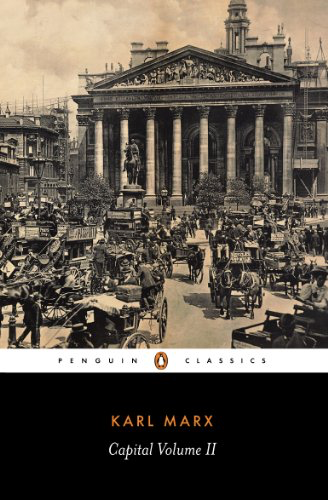
3:16: So let’s have a look at your theory. What do you mean by a mode of production?
KM: It is a definite form of activity of individuals, a definite way of expressing their life, a definite mode of life. As they express their life, so they are. What they are coincides with their production, with what and how they produce.
3:16: So history tracks the different modes of production and this is why idealist histories which track ideas gets everything the wrong way round to you?
KM: Yes. Unlike the idealist view of history it does not have to look for a category in each period but remains constantly on the real ground of history; it does not explain practice from the idea but the formation of ideas from material practice and so comes the conclusion that all the forms of and products of consciousness can be dissolved – not by intellectual criticism, not by resolution into ‘self-consciousness’, or by transformation into apparitions, specters, fancies etc but only by the practical overthrow of the actual social relations which gave rise to this idealist humbug; that not criticism but revolution is the driving forces of history, as well as of religion, philosophy and all other types of theory.
It shows that history does not end by being resolved into ‘se;f-consciousness’, as ‘spirit of the spirit’, but that at every stage of history there is found a material result, a sum of productive forces, a historically created relation of individuals to Nature and to one another, a mass of productive forces, capital, and circumstances. It shows that circumstances make men just as much as men make circumstances.
3:16: So by revolution you are talking about the material conditions – productive forces, capital, social forms of intercourse – and whether tensions between them are strong enough to tear the existing order apart or not - rather than anyone or any vanguard group coming up with an idea of having a revolution? All those groups – including Marxist groups - with their revolutionary ideas are just missing the point of your analysis?
KM: Steady Richard. Let’s not get giddy. The conditions of life determine whether or not the periodically recurring revolutionary convulsion will be strong enough to overthrow the basis of the existing order. If the material elements of a total revolution – the available productive forces and the formation of a revolutionary mass which revolts not only against particular conditions of existing society but against the whole existing production of life , the total activity on which it is based – are not present then it is quite immaterial as far as practical development is concerned whether the idea of this revolution has been expressed a hundred times already.
3:16: So a history taken to be about the exploits of princes and states, political and religious motives, even revolutionary motives, is not materialist and therefore bad history?
KM: The whole previous conception of history has either completely neglected this real basis of history or else has considered it a secondary matter. It gives the illusion of an epoch only.
3:16: And again puts the cart before the horse?
KM: Vivid, Richard. Yes. For example: When the crude social form in which the division of labour emerges among the Indians and the Egyptians engenders the caste system in their State and religion, the historian believes that the caste system is the power which has produced this crude social form. Cart before horse!
3:16: So Hegel is for you a kind of apotheosis of this upside down, bad history?
KM: The Hegelian philosophy of history is the last consequence of all this German historiography which is concerned not with real, not even with political interests but with pure thoughts which inevitably appear as a sequence of thoughts which devour one another and are finally swallowed up in ‘self-consciousness.’
3:16: You were a Hegelian once weren’t you Karl?
KM: Well Richard, I was a Young Hegelian once it is true. But, since the Young Hegelians consider conceptions, thoughts, ideas, in fact all the products of consciousness as the real chains of men it is evident that the Young Hegelians have to fight only against these illusions of the consciousness. Since, according to their fantasy, the relationships of men, all their doings, their chains and their limitations are products of their consciousness, the Young Hegelians logically put to men the moral postulate of exchanging their present consciousness for human, critical or egoistic consciousness, and thus of removing their limitations. This demand to change consciousness amounts to a demand to interpret reality in another way, that is, to recognize it by means of another interpretation. They forget, however, that to these phrases - constituting the old interpretation - they are only opposing other phrases, and that they are in no way combating the real existing world when they are merely combating the phrases of this world.
3:16: And this is why you turn Hegel on his head?
KM: I’ve already explained this Richard. Keep up.
3:16: So can there be such a thing as objective truth if your theory is right?
KM: The question whether objective truth can be attributed to human thinking is not a question of theory but is a practical question. One of the most difficult tasks confronting philosophers is to descend from the world of thought to the actual world. Language is the immediate actuality of thought. Just as philosophers have given thought an independent existence, so they were bound to make language into an independent realm.
3:16: So history’s not a spirit coming to self-consciousness?
KM: Good God no! Why this endless harping on Hegel Richard? History does nothing, it ‘possesses no immense wealth’, it ‘wages no battles’. It is man, real, living man who does all that, who possesses and fights; ‘history’ is not, as it were, a person apart, using man as a means to achieve its own aims; history is nothing but the activity of man pursuing his aims. The productive forces are the result of man’s practical energy, but that energy is in turn circumscribed by the conditions in which man is placed by the productive forces already acquired, by the form of society which exists before him, which he does not create, which is the product of the preceding generation. Consciousness does not determine life, but life determines consciousness. All mysteries which lead theory to mysticism find their rational solution in human practice and in the comprehension of this practice.
3:16: So Hegel’s done! Finished.
KM: Let it go man! What's wrong with you? The dialectic is standing on its head. It must be inverted, in order to discover the rational kernel within the mystical shell. Hegel is not to be blamed for depicting the nature of the modern state as it is, but rather for presenting what is as the essence of the state. The claim that the rational is actual is contradicted precisely by an irrational actuality, which everywhere is the contrary of what it asserts and asserts the contrary of what it is. Dialectics is the science of the general laws of motion both of the external world and of human thought.
3:16: Well Karl, I have to say that it still sounds a lot like Hegel, even if he is upside down.
KM: In Hegel’s Phenomenology the material, perceptible, objective bases of the various estranged forms of human self-consciousness are left as they are. Thus the whole destructive work results in the most conservative philosophy because it thinks it has overcome the objective world, the sensuously real world, by merely transforming it into a “thing of thought” a mere determination of self-consciousness and can therefore dissolve its opponent, which has become ethereal, in the “ether of pure thought.” Phenomenology is therefore quite logical when in the end it replaces human reality by “Absolute Knowledge”—Knowledge, because this is the only mode of existence of self-consciousness, because self-consciousness is considered as the only mode of existence of man; absolute knowledge for the very reason that self-consciousness knows itself alone and is no more disturbed by any objective world.
Hegel makes man the man of self-consciousness instead of making self-consciousness the self-consciousness of man, of real man, man living in a real objective world and determined by that world. He stands the world on its head and can therefore dissolve in the head all the limitations which naturally remain in existence for evil sensuousness, for real man. Besides, everything which betrays the limitations of general self-consciousness—all sensuousness, reality, individuality of men and of their world—necessarily rates for him as a limit. The whole of Phenomenology is intended to prove that self-consciousness is the only reality and all reality.
3:16: Maybe so, but you said earlier that capitalism is the end of a set of historical stages and will inevitably collapse because of inner contradictions into Communism, the final stage – and that sounds like a version of Hegel to my ear.
KM: As Prometheus, having stolen fire from heaven, begins to build houses and to settle upon the earth, so philosophy, expanded to be the whole world, turns against the world of appearance. The same now with the philosophy of Hegel. Communism as the positive transcendence of private property as human self-estrangement, and therefore as the real appropriation of the human essence by and for man; communism therefore as the complete return of man to himself as a social that is – human being — a return accomplished consciously and embracing the entire wealth of previous development. This communism, as fully developed naturalism, equals humanism, and as fully developed humanism equals naturalism; it is the genuine resolution of the conflict between man and nature and between man and man — the true resolution of the strife between existence and essence, between objectification and self-confirmation, between freedom and necessity, between the individual and the species. Communism is the riddle of history solved, and it knows itself to be this solution.
3:16: (whispers)Still sounds Hegelian.
KM: Well, with Hegel, the absolute spirit of history has its materials in the masses but only finds adequate expression in philosophy. But the philosopher appears merely as the instrument by which absolute spirit, which makes history, arrives at self-consciousness after the historical moment has been completed. The philosopher arrives post festum!
3:16: So are you doing economics as much as anti-Hegelian philosophy and materialist history/sociology?
KM: The economists have a singular way of proceding. For them there are only two kinds of institution, artificial and natural. Feudal institutions are artificial, those of the bourgeois are natural. In saying that the relations of bourgois production are natural the economists assert these are the relations developed in accordance with the laws of nature, independent of the influence of time. They are eternal laws which must always govern society. Thus there has been history but there is no longer any history. So the economists are the scientific representatives of the bourgeoisie.
3:16: So economics is really about historically specific actual social relations of production but they treat them as if they are timeless?
KM: Yes. Economic categories are only the theoretical expressions, the abstractions of the social relations of production. For example, M. Proudhon, holding this upside down like a true philosopher, sees in actual relations nothing but the incarnation of the principles, of these categories, which were slumbering – so M. Proudhon the philosopher tells us – in the bosom of the "impersonal reason of humanity." M. Proudhon the economist understands very well that men make cloth, linen, or silk materials in definite relations of production. But what he has not understood is that these definite social relations are just as much produced by men as linen, flax, etc. Social relations are closely bound up with productive forces. In acquiring new productive forces men change their mode of production; and in changing their mode of production, in changing the way of earning their living, they change all their social relations.
In case you missed the point earlier: The hand-mill gives you society with the feudal lord; the steam-mill society with the industrial capitalist. The same men who establish their social relations in conformity with the material productivity, produce also principles, ideas, and categories, in conformity with their social relations. Thus the ideas, these categories, are as little eternal as the relations they express. They are historical and transitory products.
3:16: Ok, well, maybe we’re getting ahead of ourselves here. How should we understand capitalist production?
KM: The three principle aspects of capitalist production are firstly, the concentration of means of production into a few hands as a result of which they are no longer the property of the direct producers but are transformed into social powers of production. Secondly, the organization of labour itself as social labour, by cooperation, division of labour and the union of labour with the natural sciences. And thirdly the creation of a world market.
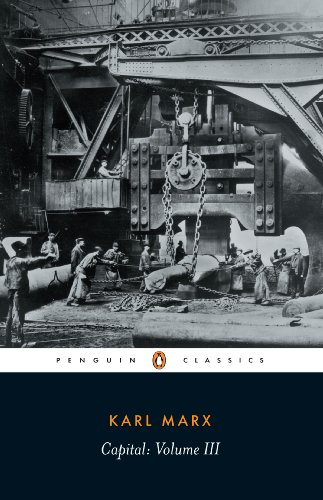
3:16: What is capital?
KM: Raw materials, instruments of labour and means of subsistence of all kinds employed in producing new raw materials, new instruments of labour and new means of subsistence. All these are created by labour, products of labour. Accumulated labour that serves as a means to new production is capital. Capital is also a social relation of production, a relation of production of bourgeois society. It is also the exchange values. All products of which it consists are commodities. Capital is not only a sum of material products, it is a sum of commodities, of exchange values, of social magnitudes. Capital presupposes wage-labour; wage –labour presupposes capital. They condition each other; each brings the other into existence.
3:16: How does the sum of commodities and exchange values become capital?
KM: By the fact that as an independent social power it preserves itself and multiplies by exchange with immediate, living labour power.
3:16: And is a proletariat necessary for capitalism?
KM: The existence of a class which possesses nothing but the ability to work is a necessary presupposition of capital, yes. It is only the dominion of past, accumulated, materialized labour over immediate living labour that transforms accumulated labour into capital. Living labour serves accumulated labour as the means of preserving and multiplying its exchange value.
3:16: So technology and people’s labour are the forces of production. And human labour in this respect is a function of it being social ?
KM: The human being is in the most literal sense a political animal not merely a gregarious animal, but an animal which can individuate itself only in the midst of society. Production by an isolated individual outside society is as much of an absurdity as is the development of language without individuals living together and talking to each other. Society does not consist of individuals, but expresses the sum of interrelations, the relations within which these individuals stand.
3:16: And class emerges from this?
KM: It seems to be correct to begin with the real and the concrete, with the real precondition, thus to begin, in economics, with, for example, the population, which is the foundation and the subject of the entire social act of production. However, on closer examination this proves false. The population is an abstraction if I leave out, for example, the classes of which it is composed. ... if I were to begin with the population, this would be a chaotic conception of the whole, and I would then, by means of further determination, move analytically towards ever more simple concepts, from the imagined concrete towards ever thinner abstractions until I had arrived at the simplest determinations. From there the journey would have to be retraced until I had finally arrived at the population again, but this time not as the chaotic conception of a whole, but as a rich totality of many determinations and relations.
3:16: That’s out there Karl. I’m loving it! So - no individuals in your theory, just classes?
KM: Here individuals are dealt with only in so far as they are the personifications of economic categories, embodiments of particular class-relations and class-interests. My standpoint, from which the evolution of the economic formation of society is viewed as a process of natural history, can less than any other make the individual responsible for relations whose creature he socially remains, however much he may subjectively raise himself above them.
3:16: So, to be clear, is it the combination of the productive forces with the relations of production that constitute each specific mode of production?
KM: Yes. The community of men, or the manifestation of the nature of men, their mutual complementing the result of which is species-life, truly human life—this community is conceived by political economy in the form of exchange and trade. Society is a series of mutual exchanges. It is precisely this process of mutual integration. Society, says Adam Smith, is a commercial society. Each of its members is a merchant. It is seen that political economy defines the estranged form of social intercourse as the essential and original form corresponding to man's nature.
3:16: So what takes place in the exchange between capitalist and wage-labourer?
KM: The labourer receives means of subsistence in exchange for his labour-power; but the capitalist receives the productive activity of the worker, the creative force by which the worker not only replaces what he consumes but also gives to the accumulated labour a greater value than it previously possessed.
3:16: This exchange traps and oppresses the worker doesn’t it?
KM: Well, the worker gets from the capitalist a portion of the existing means of subsistence. But for what purpose do these means of subsistence serve him? For immediate consumption. But as soon as I consume means of subsistence they are irrevocably lost to me, unless I employ the time during which these means sustain my life in producing new means of subsistence, in creating by my labour new values I place of those lost in consumption. But it is just this noble reproductive power that the worker surrenders to the capitalist in exchange for means of subsistence received. Consequently he has lost it for himself.
3:16: So are you saying exploitation only happens at the point of production or are relations of distribution, as the economist Ricardo claims, also important here?
KM: The structure of distribution is completely determined by the structure of production. Distribution is itself a product of production, not only in its object, in that only the results of production can be distributed, but also in its form, in that the specific kind of participation in production determines the specific forms of distribution, i.e. the pattern of participation in distribution. Any distribution whatever of the means of consumption is only a consequence of the distribution of the conditions of production themselves. The latter distribution, however, is a feature of the mode of production itself. The capitalist mode of production, for example, rests on the fact that the material conditions of production are in the hands of nonworkers in the form of property in capital and land, while the masses are only owners of the personal condition of production, of labor power.
If the elements of production are so distributed, then the present-day distribution of the means of consumption results automatically. If the material conditions of production are the co-operative property of the workers themselves, then there likewise results a distribution of the means of consumption different from the present one. Vulgar socialism (and from it in turn a section of the democrats) has taken over from the bourgeois economists the consideration and treatment of distribution as independent of the mode of production and hence the presentation of socialism as turning principally on distribution. After the real relation has long been made clear, why retrogress again?
3:16: Why indeed Karl, why indeed? So private property is how the capitalist funds their exploitation of the workers according to you?
KM: Under private property, each tries to establish over the other an alien power, so as thereby to find satisfaction of his own selfish need. The increase in the quantity of objects is therefore accompanied by an extension of the realm of the alien powers to which man is subjected, and every new product represents a new potentiality of mutual swindling and mutual plundering.
3:16: And it’s because of this process that property is so important to you isn’t it? Why doesn’t wage labour create property for the worker?
KM: Because it creates capital, that is, that kind of property which exploits wage labour and which cannot increase except upon condition of begetting a new supply of wage-labour for fresh exploitation. Property in its present form is based on the antagonism of capital and wage labour. To be a capitalist is to have not only a purely personal, but a social, status in production. Capital is a collective product. Capital is therefore not personal, it is social power.
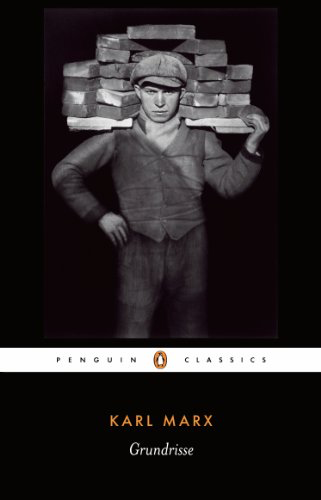
3:16: So when you go on about abolishing property you’re really just saying let’s end exploitation, and if we could see things right, we’d all want to get rid of it too?
KM: The capitalist mode of production and accumulation, and therefore capitalist private property, have for their fundamental condition the annihilation of self-earned private property: in other words, the expropriation of the labourer. Modern bourgeois private property is the final and most complete expression of the system of producing and appropriating products, that is based on class antagonisms, on the exploitation of the many by the few.
3:16: Hmm. I can see that upsetting quite a few people. I like having my own things Karl.
KM: You are horrified at our intending to do away with private property. But in your existing society private property is already done away with for nine-tenths of the population; its existence for the few is solely due to its non-existence in the hands of those nine-tenths. You reproach us, therefore, with intending to do away with a form of property, the necessary condition for whose existence is the non-existence of any property for the immense majority of society.
3:16: Not sure about your figures there Karl…
KM: Look Richard. Wages and private property are identical. Indeed, where the product, as the object of labor, pays for labor itself, there the wage is but a necessary consequence of labor’s estrangement. Likewise, in the wage of labor, labor does not appear as an end in itself but as the servant of the wage... An enforced increase of wages (disregarding all other difficulties, including the fact that it would only be by force, too, that such an increase, being an anomaly, could be maintained) would therefore be nothing but better payment for the slave, and would not win either for the worker or for labor their human status and dignity.
Indeed, even the equality of wages, as demanded by Proudhon, only transforms the relationship of the present-day worker to his labor into the relationship of all men to labor. Society would then be conceived as an abstract capitalist. Wages are a direct consequence of estranged labor, and estranged labor is the direct cause of private property. The downfall of the one must therefore involve the downfall of the other.
3:16: Can you say a little more about the relationship between capital and labour?
KM: Capital and labour relate to each other here like money and commodity; the former is the general form of wealth, the other only the substance destined for immediate consumption. Capital’s ceaseless striving towards the general form of wealth drives labour beyond the limits of its natural paltriness, and thus creates the material elements for the development of the rich individuality which is as all-sided in its production as in its consumption, and whose labour also therefore appears no longer as labour, but as the full development of activity itself, in which natural necessity in its direct form has disappeared; because natural need has been replaced by historically produced need.
This is why capital is productive; that is, an essential relation for the development of the social productive forces. It ceases to exist as such only where the development of these productive forces themselves encounters its barrier in capital itself.
3:16: You liken capitalist management to despotism don’t you?
KM: The process of production itself – a social process for producing use-value and a process for creating surplus-value – is despotic. As cooperation extends its scale this despotism assumes particular forms. Superintendence necessarily arises in all modes of production which are based on the antagonism between the worker as a direct producer and the owner of the means of production. The greater this antagonism the more important is the role played by the supervisor. Hence it reaches its maximum in a slave system but it is indispensible also under capitalist mode of production since the process of production is at the same time the process by which the capitalist consumes the labour power of the worker.
3:16: So management and superintendence of the system to coordinate and keep things on track is most needed when there’s this antagonism between direct producer and owner?
KM: The labour of management and superintendence as a consequence of the antagonism, as a function resulting from the servitude of the direct producers has often been quoted in justification of this relation of servitude itself. And exploitation, the appropriation of the unpaid labour of others, has quite as often been represented as the reward justly due to the owner of capital for his labour!
3:16: So capitalism must take the structure of a master/slave relationship – the kind of thing Hegel has?
KM: Enough of the Hegel Richard! The wage-labourer, like the slave, must have a master to work and rule him. And once this relation of master and servant has been presupposed it is quite proper to compel the wage-labourer to produce his own wages and also the wages of the superintendence, a compensation for the labour of ruling and superintending him.
3:16: So what we now talk about as managerialism is a key element to capitalism?
KM: Yes. The labour of superintendence and management arising from the antagonistic character and the rule of capital over labour which all modes of production based on class antagonism have in common with the capitalist mode, is directly and inseperably connected, under the capitalist system also, with those particular productive functions which are entailed by all cooperative social labour of individuals. The industrial managers and not the industrial capitalists are the soul of our industrial system. The capitalist mode of production itself has brought matters to such a point that the labour of superintendence , entirely separated from the ownership of capital, walks the streets. After all, the conducter of an orchestra need not be the owner of the instruments of his members, nor is it part of his function as a conductor that he should have anything to do with the wages of the other musicians.
3:16: So with these people in place the capitalist doesn’t actually have to do anything but get the profits?
KM: You gottit Richard. The capitalist has become just as superfluous as a functionary in production as he himself, in his highest developed form, finds the large landowner superfluous. The capitalist disappears from the process of production.
3:16: Getaway Karl!!!
KM: Oh it gets worse Richard. On the basis of capitalist production a new swindle develops in joint-stock enterprises in connection with the wages of management. It consists in placing alongside and above the real manager a board of managers or directors for whom superintendence and management are in practice only a pretext for plundering the shareholders and enriching themselves.
3:16: What do you make of Adam Smith’s theory about productive and unproductive labour?
KM: Many writers who have attacked his theory regard consumption as the necessary stimulus to production, and employers who live upon revenues, the unproductive workers, as being just as productive as the productive workers themselves, because they extend the limits of material consumption and consequently of production. However, from the viewpoint of bourgeois economics these were merely apologetics either for the idle rich and the ‘unproductive workers’, or for powerful governments which spent money hand over fist in order to increase the national debt to create new sinecures in the State and rich livings in the Church.
3:16: Well that all sounds like a shame and a crime Karl.
KM: Well now Richard: a philosopher produces ideas, a poet verses, a parson sermons, a professor text books. A criminal produces crime. But if the relationship between this latter branch of production and the whole productive activity of society is examined a little more closely, one is forced to abandon a number of prejudices.
3:16: Like what?
KM: Well, the criminal produces not only crime but also criminal law; he produces the professor who delivers lectures on this criminal law, and even the inevitable text book in which the professor presents his lectures as a commentary for sale in the market. There results an increase in material wealth which the author derives from the manuscript of his text book. The criminal produces the whole apparatus of the police and criminal justice, detectives, judges, executioners, juries etc – so many categories of the social division of labour, diverse abilities of the human spirit, new needs and new ways of satisfying them. Torture itself has provided occasion for the most ingenious mechanical inventions, employing a host of honest workers in the production of these instruments.
The criminal produces an impression now moral, now tragic, renders a service by arousing the moral and aesthetic sentiments of the public. He producers art, literature, novels and the tragic drama, as Oedipus and Richard III, Mullner’s Schuld and Schiller’s Rauber.
3:16: You sound like JG Ballard.
KM: Well yes, the criminal interrupts the monotony and security of bourgeois life. He protects it from stagnation and brings on a restless tension, that mobility of spirit without which the stimulation of competition would be blunted. Crime takes off the labour market a portion of the excess population, diminishes competition, stops wages falling below the minimum, while the war on crime absorbs another part of the same population.
3:16: So the criminal is another of the equilibrating forces of capitalism?
KM: Of course Richard. Would the locksmith’s trade have attained its present perfection without thieves? Would the manufacturer of banknotes have arrived at its present excellence without counterfeiters? Would the microscope have entered ordinary commercial life had there been no forgers? The development of applied chemistry is as much due to the adulteration of its wares as to honest productive effort. Crime, by its ceaseless development of new means of attacking property calls into existence new measures of defence. I could go on but you get the point.
3:16: Didn’t Mandeville put this sort of thing into his ‘Fable of the Bees’?
KM: Mandeville simply had the merit of being infinitely more audacious and more honest than those narrow apologists for bourgeois society.
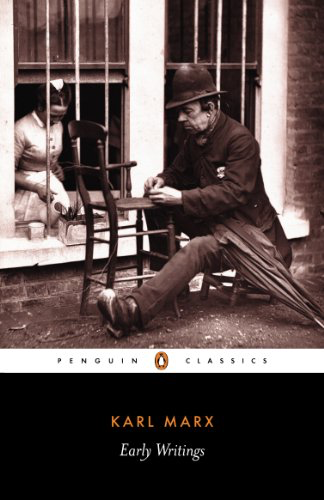
3:16: So let’s take stock. Is it the relationship between the owners of the conditions of production to the direct producers that we should always be looking at if we’re to understand what is going on?
KM: Richard, it is always the direct relationship of the owners of the conditions of production to the direct producers — a relation always naturally corresponding to a definite stage in the development of the methods of labour and thereby its social productivity — which reveals the innermost secret, the hidden basis of the entire social structure and with it the political form of the relation of sovereignty and dependence, in short, the corresponding specific form of the state. This does not prevent the same economic basis — the same from the standpoint of its main conditions — due to innumerable different empirical circumstances, natural environment, racial relations, external historical influences, etc. from showing infinite variations and gradations in appearance, which can be ascertained only by analysis of the empirically given circumstances.
3:16: So if we look out today what we’re seeing is class struggle, even though people don’t seem to want to accept that and get distracted by conflicts set up by the ruling class to distract us from targetting them ?
KM: Political power, properly so called, is merely the organised power of one class for oppressing another. The history of all hitherto existing society is the history of class struggles. Freeman and slave, patrician and plebeian, lord and serf, guildmaster and journeyman, in a word, oppressor and oppressed, stood in constant opposition to one another, carried on an uninterrupted, now hidden, now open fight, that each time ended, either in the revolutionary reconstitution of society at large, or in the common ruin of the contending classes.
3:16: Capitalism is a buzz though isn’t it?
KM: It’s wild Richard. Constant revolutionizing of production, uninterrupted disturbance of all social conditions, everlasting uncertainty and agitation, distinguish this bourgeois epoch from all earlier ones. All fixed, fast-frozen relations, with their train of ancient and venerable prejudices and opinions, are swept away; all new-formed ones become antiquated before they can ossify. All that is solid melts into air, all that is holy is profaned, and man is at last compelled to face with sober senses his real conditions of life and his relations with his kind.
3:16: And the bourgeois rule this wild techno/economic modernity?
KM: The essential condition for the existence and sway of the bourgeoisie class, is the formation and augmentation of capital; and the condition for capital is wage-labor.
3:16: And some good things have come out of this?
KM: Well, the bourgeoisie, wherever it has got the upper hand, has put an end to all feudal, patriarchal, idyllic relations. It has pitilessly torn asunder the motley feudal ties that bound man to his 'natural superiors,' and has left remaining no other nexus between man and man than naked self-interest, callous 'cash payment.' The bourgeoisie has stripped of its halo every occupation hitherto honored and looked up to with reverent awe. It has converted the physician, the lawyer, the priest, the poet, the man of science, into its paid wage laborers. The bourgeoisie has torn away from the family its sentimental veil, and has reduced the family relation to a mere money relation.
3:16: They're revolutionaries?.
KM: The bourgeoisie cannot exist without constantly revolutionizing the instruments of production, and thereby the relations of production, and with them the whole relations of society.
3:16: Weren't the rulers of all the previous social forms also revolutionaries like this?
KM: Conservation of the old modes of production in unaltered forms, was, on the contrary, the first condition of existence for all earlier industrial classes. Constant revolutionizing of production, uninterrupted disturbance of all social conditions, everlasting uncertainty and agitation, distinguish the bourgeois epoch from all earlier ones.
3:16: So all the things we like - modern technologies, urban cool, that's unique to the bourgeois?
KM: Sure. The bourgeoisie has created enormous cities, has greatly increased the urban population as compared with the rural, and has thus rescued a considerable part of the population from the idiocy of rural life. Just as it has made the country dependent on the towns, so it has made barbarian and semi-barbarian countries dependent on the civilized ones, nations of peasants on nations of bourgeois, the East on the West.
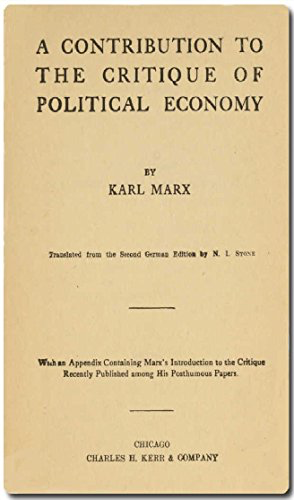
3:16: They’re global revolutionaries to boot?
KM: Giddy-up Richard: Oh yes. The bourgeoisie, by the rapid improvement of all instruments of production, by the immensely facilitated means of communication, draws all, even the most barbarian, nations into civilization. The cheap prices of its commodities are the heavy artillery with which it batters down all Chinese walls, with which it forces the barbarians' intensely obstinate hatred of foreigners to capitulate. It compels all nations, on pain of extinction, to adopt the bourgeois mode of production; it compels them to introduce what it calls civilization into their midst, that is, to become bourgeois themselves. In one word, it creates a world after its own image.
3:16: So they’re important in all sorts of ways for communism?
KM: The bourgeoisie is just as necessary a precondition for the socialist revolution as is the proletariat itself.
3:16: Do you oppose colonialism by the way?
KM: Come on Richard! A nation cannot become free and at the same time continue to oppress other nations.
3:16: Despite all the benefits, Capitalism’s vampiric and like a werewolf according to you. Why?
KM: Jeez! I have to spell it out some more??? Well, in its blind unrestrainable passion, its werewolf hunger for surplus-labor, capital oversteps not only the moral, but even the merely physical maximum bounds of the working-day. It usurps the time for growth, development, and healthy maintenance of the body. It steals the time required for the consumption of fresh air and sunlight. It haggles over a meal-time, incorporating it where possible with the process of production itself, so that food is given to the laborer as to a mere means of production, as coal is supplied to the boiler, grease and oil to the machinery. It reduces the sound sleep needed for the restoration, reparation, refreshment of the bodily powers.
Capital cares nothing for the length of life of labor-power. All that concerns it is simply and solely the maximum of labor-power, that can be rendered fluent in a working-day. It attains this end by shortening the extent of the laborer’s life, as a greedy farmer snatches increased produce from the soil by robbing it of its fertility. Modern bourgeois society with its relations of production, of exchange, and of property, a society that has conjured up such gigantic means of production and of exchange, is like the sorcerer, who is no longer able to control the powers of the nether world whom he has called up by his spells.
3:16: And is its form of exploitation worse than previous types?
KM: It has drowned the most heavenly ecstasies of religious fervour, of chivalrous enthusiasm, of Philistine sentimentalism, in the icy water of egotistical calculation. It has resolved personal worth into exchange value, and in place of numberless indefeasible chartered freedoms, it has set up that single, unconscionable freedom -- free trade. In one word, for exploitation, veiled by religious and political illusions, it has substituted naked, shameless, direct, brutal exploitation.
3:16: So what do you mean by the ideological superstructure of society?
KM: The ideas of the ruling class are in every epoch the ruling ideas, that is, the class which is the ruling material force of society, is at the same time its ruling intellectual force. The class which has the means of material production at its disposal, has control at the same time over the means of mental production, so that thereby, generally speaking, the ideas of those who lack the means of mental production are subject to it. The ruling ideas are nothing more than the ideal expression of the dominant material relationships, the dominant material relationships grasped as ideas.
3:16: So ideology is the way the ruling class disguise their self interest so we think its in our interest? You’re saying that even the governing role of social labour is occulted by the workings of the economy itself. We’re being fooled and we need a hermeneutics of suspicion to see through this. Commodity fetish is one form of this occultation– what is commodity fetishism and can you give us an example of this?
KM: Ok: It is simply a definite social relation between men that assumes in their eyes the fantastic form of a relation between things. To find an analogy we must have recourse to the nebulous regions of the religious world. In that world the productions of the human brain appear as independent beings endowed with life and entering into relation both with one another and with the human race. So it is, in the world of commodities, with the products of men’s hands. This I call the fetishism which attaches to the products of labour, so soon as they are produced as commodities and which is therefore inseparable from the production of commodities.
This fetishism of commodities has its origin in the peculiar social character of the labour that produces them. An example? In interest-bearing capital this automatic fetish is elaborated into its pure form, self-valorizing value, money breeding money, and in this form no longer bears any marks of its origin. The social relation is consummated in the relationship of a thing, money, to itself. Capital is now a thing, but the thing is capital. The money's body is now by love possessed – to twist a lovely thought by Goethe.
3:16: So if we want to change things, which do we change – the ideas or the superstructure?
KM: In studying such transformations it is always necessary to distinguish between the material transformation of the economic conditions of production, which can be determined with the precision of natural science, and the legal, political, religious, artistic or philosophic – in short, ideological forms in which men become conscious of this conflict and fight it out. No social order is ever destroyed before all the productive forces for which it is sufficient have been developed, and new superior relations of production never replace older ones before the material conditions for their existence have matured within the framework of the old society. Mankind thus inevitably sets itself only such tasks as it is able to solve, since closer examination will always show that the problem itself arises only when the material conditions for its solution are already present or at least in the course of formation.
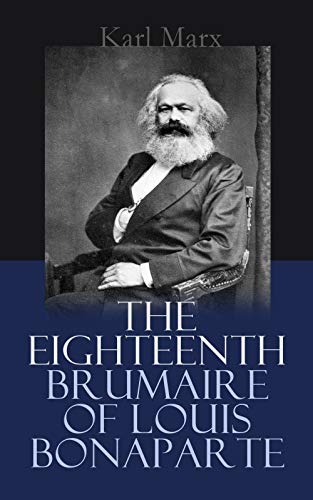
3:16: So we have to wait for capitalism to run its course before we get anywhere close to communism?
KM: There is in every social formation a particular branch of production which determines the position and importance of all the others, and the relations obtaining in this branch accordingly determine the relations of all other branches as well. It is as though light of a particular hue were cast upon everything, tingeing all other colours and modifying their specific features.
3:16: So when will capitalism end?
KM: Capitalism must necessarily have rendered the great mass of humanity `propertyless,' and produced, at the same time, the contradiction of an existing world of wealth and culture, both of which conditions presuppose a great increase in productive power, a high degree of development . This development of productive forces is an absolutely necessary practical premise because without it want is merely made general, and with destitution the struggle for necessities and all the old filthy business would necessarily be reproduced; and furthermore, because only with this universal development of productive forces is a universal intercourse between men established, which produces in all nations simultaneously the phenomenon of the `propertyless' mass. Empirically, communism is only possible as the act of the dominant peoples `all at once' and simultaneously, which presupposes the universal development of productive forces and the world intercourse bound up with communism.
3:16: So at the moment the ruling class is a very few very very rich people – the 0.1%, or the 0.01% of the population – who the rest of us sell our labour to as we get poorer and poorer. So this is possibly the sort of thing you’re talking about – enough of us getting to the point of knowing we’ve no chance of joining the ruling class and getting poor enough to be miserable.
KM: The contradiction between the individuality of each separate proletarian and labor, the condition of life forced upon him, becomes evident to him, himself, for he is sacrificed from youth upwards and, within his own class, has no chance of arriving at the conditions which would place him in the other class. The modern laborer, instead of rising with the progress of industry, sinks deeper and deeper below the conditions of existence of his own class. He becomes a pauper, and pauperism develops more rapidly than population and wealth. And here it becomes evidence, that the bourgeoisie is not entitled any longer to be the ruling class in society. It is unfit to rule because it is incompetent to assure an existence to its slave within his slavery. Society can no longer live under this bourgeoisie, its existence is no longer compatible with society.
3:16: So the only reason we haven’t had a revolution yet is because things haven’t got bad enough for enough people to motivate it? And self interest will determine when that happens, not a realisation that things are morally wrong or whatever?
KM: That’s the theory.
3:16: So should we try change things for the better within capitalism or let the immiseration commence? Some Marxists I know argue that minimum wage laws or occupational health and safety regulations and so on – health plans, shorter working weeks, work/life balance, voting , education, national health systems, giving to charities etc are all helping capitalism survive? They argue that we should stopand let our condition get bad enough for the system to break.
KM: Well, as I said earlier, if anything is certain, it is that I myself am not a Marxist and they are idiots! Look, it must be acknowledged that our labourer comes out of the process of production other than he entered. In the market he stood as owner of the commodity “labour-power” face to face with other owners of commodities, dealer against dealer. The contract by which he sold to the capitalist his labour-power proved, so to say, in black and white that he disposed of himself freely. The bargain concluded, it is discovered that he was no “free agent,” that the time for which he is free to sell his labour-power is the time for which he is forced to sell it, that in fact the vampire will not lose its hold on him “so long as there is a muscle, a nerve, a drop of blood to be exploited.” For “protection” against “the serpent of their agonies,” the labourers must put their heads together, and, as a class, compel the passing of a law, an all-powerful social barrier that shall prevent the very workers from selling by voluntary contract with capital, themselves and their families into slavery and death.
3:16: So there is there a place for socialism within bourgeois capitalism ?
KM: Yes. Socialists and communists are the theorists of the proletariat. As long as the proletariat is not sufficiently developed to constitute itself into a class, as long therefore as the struggle of the proletariat with the bourgeoisie has not acquired a political character and while the productive forces are not yet sufficiently developed within bourgeois society itself to give an indication of the material conditions necessary for the emancipation of the proletariat and the constitution of a new society, these theorists remain Utopians who, in order to remedy the distress of the oppressed classes improvise systems and pursue a regenerative science.
3:16: So we must work to live well within capitalism and not deliberately stand in the way of welfare reforms, work life balance and the like?
KM: Yes. But in place of the pompous catalogue of the “inalienable rights of man” comes the modest Magna Charta of a legally limited working-day, which shall make clear when the time which the worker sells is ended, and when his own begins. Quantum mutatus ab illo!
3:16: So via the logic of capitalist selfishness means we must and will strive to live well and make improvements. For you, self interest motivates social reforms within capitalism. Is this why you aren’t offering a moral theory of any sort?
KM: Exactly: the proletarian movement is simply in the interests of the vast majority. Communists fight for the momentary interests of the working class, not the requirements of truth; but the interests of the proletariat; not the interests of Human Nature, nor of Man in general, who belongs to no class, has no reality and who exists only in the misty realm of philosophical fantasy. The proletarian movement is the self-conscious, independent movement of the immense majority, in the interests of the immense majority. When the proletariat declares the dissolution of the hitherto existing world order, it merely declares the secret of its own existence, since it is in fact the dissolution of this order. When it demands the negation of private property, it is only laying down as a principle for society what society has laid down as a principle for the proletariat, what has already been incorporated in itself without its consent as the negative result of society.
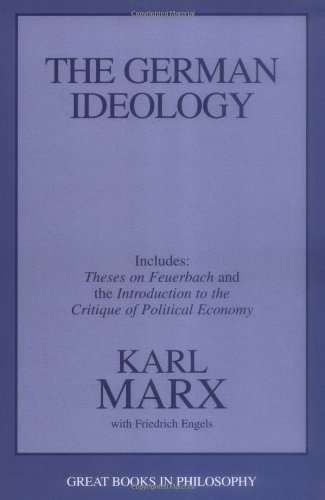
3:16: So don’t we need to establish ideals towards which we can work?
KM: Communism is not a state of affairs which is to be established, an ideal to which reality will have to adjust itself. We call communism the real movement which abolishes the present state of things. The conditions of this movement result from the premises now in existence. The theoretical conclusions of the Communists are in no way based on ideas or principles that have been invented, or discovered, by this or that would -be universal reformer. They merely express, in general terms, actual relations springing from an existing class struggle, from a historical movement going on under our very eyes. The abolition of existing property relations is not at all a distinctive feature of communism. All property relations in the past have continually been subject to historical change consequent upon the change in historical conditions.
3:16: So feminism, for example, isn’t a moral thing but just the realisation of the self interest of the vast majority?
KM: Of course. The bourgeois sees in his wife a mere instrument of production. He hears that the instruments of production are to be exploited in common, and, naturally, can come to no other conclusion than that the lot of being common to all will likewise fall to the women. He has not even a suspicion that the real point is to do away with the status of women as mere instruments of production. For the rest, nothing is more ridiculous than the virtuous indignation of our bourgeois at the community of women which, they pretend, is to be openly and officially established by the Communists. The Communists have no need to introduce the community of women; it has existed almost from time immemorial.
Our bourgeois, not content with having the wives and daughters of their proletarians at their disposal, not to speak of common prostitutes, take the greatest pleasure in seducing each other's wives. Bourgeois marriage is in reality a system of wives in common and thus, at the most, what the Communists might possibly be reproached with, is that they desire to introduce, in substitution for a hypocritically concealed, an openly legalised community of women. For the rest, it is self-evident that the abolition of the present system of production must bring with it the abolition of the community of women springing from that system, i.e., of prostitution both public and private.
In this respect you English, Richard, and still more the gallant French, are burdened with a spirit of narrow-mindedness anybody who knows anything of history knows that great social changes are impossible without the feminine ferment. Social progress can be measured exactly by the social position of the fair sex (the ugly ones included).
3:16: That's a bit off Karl, even if beauty is just another ideological tool of oppression. We're not in the 1970's now!
KM: Fine.
3:16: And should anti racism, like feminism, be understood as class struggle ?
KM: You’re on fire Richard! Labor in the white skin can never free itself as long as labor in the black skin is branded.
3:16: Very cool. But it’s not by moral theories but by the logic of capitalism and our instrumentalist, practical needs that we base our struggles to make changes for the good of the vast majority?
KM: In the struggle against that state of affairs, criticism is no passion of the head, it is the head of passion. It is not a lancet, it is a weapon. Its object is its enemy, which it wants not to refute but to exterminate. For the spirit of that state of affairs is refuted. In itself, it is no object worthy of thought, it is an existence which is as despicable as it is despised. Criticism does not need to make things clear to itself as regards this object, for it has already settled accounts with it. It no longer assumes the quality of an end-in-itself, but only of a means. Its essential pathos is indignation, its essential work is denunciation.
3:16: So basically, if people are on the wrong side of the struggle they’re just our enemies.
KM: Yes. It is all the more clear what we have to accomplish at present: I am referring to ruthless criticism of all that exists, ruthless both in the sense of not being afraid of the results it arrives at and in the sense of being just as little afraid of conflict with the powers that be.
3:16: Are we alienated in capitalism?
KM: Every alienation of man from himself and from nature appears in the relation that he postulates between other men and himself and Nature. Through alienated labour man not only produces his relation to the object and to the process of production, as alien and hostile men; he also produces the relation of other men to his production and his product, and the relation between himself and other men.
3:16: What makes this 'alienation of labour', rather than just labour?
KM: OMG. We went through this! The work is external to the worker, not part of his nature. He doesn’t fulfil himself, has a feeling of misery not wellbeing, is physically exhausted and mentally debased. He feels at home only in his leisure, at work he is homeless. His work isn’t voluntary but imposed, it’s forced labour. It is only a means of satisfying other needs. It is avoided whenever possible. It is not his work but work for someone else.
3:16: And is money the great sign of alienation?
KM: Mill said money was the intermediary of exchange – it’s an excellent conceptualization of its nature. This alien intermediary – for man should be the intermediary between men – man sees his will, his activity and his relation to others as a power which is independent of him and of them. This intermediary becomes a real god. As Shakespeare points out, money is both the visible deity, the transformation of all human and natural qualities into their opposite, the universal confusion and inversion of things; it brings incompatibles into fraternity: and also the universal whore, the universal pander between men and nations.
3:16: What about equality – do you support equal rights?
KM: Equal right is still burdened with bourgeois limitations. The right of the producers is proportional to the labour they supply; the equality consists in the fact that measurement is made with an equal standard, labour.
3:16: Why is that a problem?
KM: Because one man is superior to another physically or mentally and so supplies more labour in the same time, or can labour for a longer time; and labour , to serve as a measure, must be defined by its duration or intensity, otherwise it ceases to be a standard of measurement. The equal right is an unequal right for unequal labour. Further, one worker is married and another is not; one has more children than another, and so on. Thus, with an equal performance of labour, and hence an equal share in the social consumption fund, one individual will in fact receive more than another, one will be richer than another, and so on. To avoid all these defects , right, instead of being equal, would have to be unequal.
3:16: Ok, what do you think is going to happen when capitalism collapses?
KM: Well, if enlightened self interest is the principle of all morality it is necessary for the private interest of each man to coincid with the general interest of humanity. If man is not free in the materialist’s sense, that is, if he is not negatively free to avoid this or that event, but is positively free to express his true individuality, then rather than punishing individuals for their crimes we should destroy the social conditions which engender crime, and give to each individual the scope which he needs in society in order to develop his life.
3:16: So will communism bring about the right kind of rights, rather than the equal rights of the bourgeois?
KM: Yes. When labour is no longer merely a means of life but has become life’s principle need; when the productive forces have all increased with the all-round development of the individual, and all the springs of cooperative wealth flow abundantly, only then will it be possible to transcend the narrow outlook of the bourgeois right and only then will society be able to inscribe on its banners: From each according to his ability, to each according to his needs.
3:16: Just to be clear, what is communism?
KM: Communism is the positive abolition of private property, of human alienation and thus the real appropriation of human nature, through and for man. It is therefore the return of man himself as a social, that is, really human being, a complete and conscious return which assimilates all the wealth of previous development. Communism as a complete humanism is humanism, and as a complete humanism is naturalism. It is the definitive resolution of the antagonism between man and nature, and between man and man. It is the true solution of the conflict between existence and essence, between objectification and self-affirmation, between freedom and necessity, between individual and species. It is the solution to the riddle of history and knows itself to be this solution.
3:16: Can’t we get this by making capitalism more benign – can’t capitalism make sure there’s never enough immiseration and unhappiness to break it and ensure enough of us think we’re free enough for life to be bearable forever?
KM: In theory individuals appear to have greater freedom under the rule of the bourgeoisie than before; in reality of course they are less free, because they are subject to the power of things.
3:16: But what if we enjoy things and what if capitalism can give us a lot of leisure through technological innovation and so on? As you yourself point out, innovation via technology is capitalism's revolutionary way – why won't capitalism ensure we all get just enough to not feel oppressed ?
KM: Well the abolition of the old division of labour is diametrically opposed to the capitalist mode of production and to the economic condition of the labourers which corresponds to it. The realm of freedom only begins where that labour which is determined by need and external purposes ceases and is by its very nature outside the sphere of material production proper.
3:16: Right, so let's imagine capitalism collapses. What happens to the state?
KM: Ok, so you’re asking; what changes will the State undergo in communist society? In other words, what social functions will remain there which are analogous to the present function of the state? This question can only be answered scientifically, and one does not get a flea-hop nearer to the problem by any number of juxtapositions of the word ‘people’ with the word ‘State’! What I think is that between the capitalist and communist society lies the period of the revolutionary transformation of the one into the other. There corresponds to this also a political transition period in which the State can be nothing but the revolutionary dictatorship of the proletariat.
3:16: Hmm. Dictatorship sounds a bit nasty Karl. What about freedom? A lot of anti-communists these days contrast communism with their freedom in the capitalist state.
KM: The realm of freedom only begins where that labour which is determined by need and external purposes ceases and is therefore outside the sphere of material production proper. Freedom cannot consist of anything else but the fact that socialized mankind, the associated producers , regulate their interchange with Nature rationally, bring it under their common control, instead of being ruled by it as by some blind power, and accomplish their task with the least expenditure of energy and under such conditions as are proper and worthy for human beings. This always remains a realm of necessity. Beyond it begins that development of human potentiality for its own sake, the true realm of freedom, which can only flourish upon that realm of necessity as its basis.
3:16: So what communism is, and real freedom, is the state where we get our needs with the least amount of hardship so we can develop our potential, whatever that is – a bit like having three day weeks or early retirement with resources attached for everyone to do their own thing?
KM: Richard, the shortening of the working day is its fundamental prerequisite so we can hunt in the morning, fish in the afternoon, rear cattle in the evening, criticize after dinner, just as they have a mind, without ever becoming hunter, fisherman, shepherd or critic.
3:16: I like the sound of that! Where do the arts sit in all this? Are they too merely epiphenomena of the economic superstructure?
KM: Aesthetic phenomena are to be regarded as a cultural activity of homo sapiens in his slow progress to self-realisation within the matrix of the socio-historical processes. To non-isolate phenomena of the arts, which variously depend on other manifestations of culture, social, political, moral, religious and scientific, influence in turn these other spheres of activity. Moreover , the system of mutual dependencies and complex interrelations is in each case twofold. It is synchronic, occurring across the structure of society within a given moment, and diachronic, occurring as an aspect of historical process influenced by the past, and exercising possible influence on the future nature of culture.
3:16: So the arts are to be understood in historicist terms?
KM: The continual dynamic flux and decline of the always complex ideological outlooks are, in the final analysis, conditioned by the general contradictions and evolutions of class society. But the dynamism arises also from the contradiction between crystallized ideological outlooks and emergent attitudes. Capitalist production is inimical to certain kinds of intellectual production – to art and poetry for instance. Milton, for instance, who did Paradise Lost for £5 was an ‘unproductive worker’. The writer who turns out factory hack-work for his book seller is a ‘productive worker’. Milton produced Paradise Lost for the same reason that a silk worm produces silk. It was an activity wholly natural to him. Go figure.
3:16: And finally, for the readers here at 3:16, are there five books you can recommend that will take us further into your philosophical world?
KM: To choose five from the collected works of Shakespeare, Goethe, Cervantes, Luther, Dante, Boiardo, Tasso, Aeschylus, Diderot, Pushkin, Sterne, Dickens, Charlotte Bronte, George Eliot, Mary Shelley, Thackeray, Moliere, Racine, Voltaire, Heine, Bulwer-Lytton, Scott, Fielding, Byron, Chamisso, Rabalais, Balzac, Kant, Hegel, Herder, Winckelman, Lessing, Cobbet, Hoffman, Schiller, Schlegel, Fichte, … ach. Impossible but I shall say these:
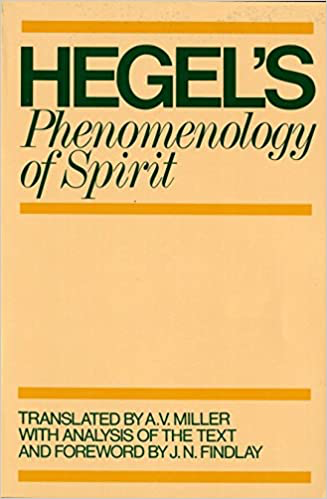
Hegel’s Phenomenology
The Phenomenology is a hidden, mystifying crtique, still unclear to itself; but in so far as it steadily grasps man’s alienation – even if man appears in the guise of the mind or spirit – all the elements of criticism lie concealed in it, prepared already, and elaborated, in a way that rises far above Hegel’s own standpoint.
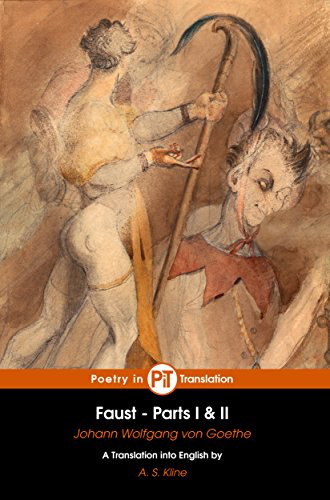
Goethe Faust
Mephistopheles gives voice to the evil spirit of temptation where every need is an opportunity to approach one’s neighbour in the semblance of the utmost amiability and to say to him: dear friend , I will give you what you require , but you know the necessary condition; you know with what kind of ink you have to sign yourself over to me; I dupe you in providing enjoyment for you. Genius.
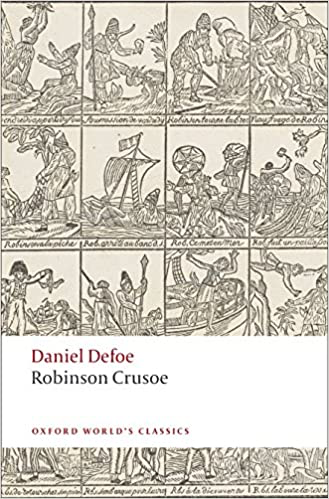
Defoe Robinson Crusoe
The individual and isolated hunter and fisherman with whom Smith and Ricardo begin belongs to the unimaginative conceits of eighteenth century Robinson Crusoe stories. What we are here faced with is the anticipation of bourgeois society, in preparation since the sixteenth century and making great strides towards its maturity in the eighteenth. In this society of free competition the individual appears free from natural bonds etc which made him, in earlier epochs, part of a definite, limited human conglomerate. Smith and Ricardo still stand with both feet on the shoulders of the eighteenth-century individual.
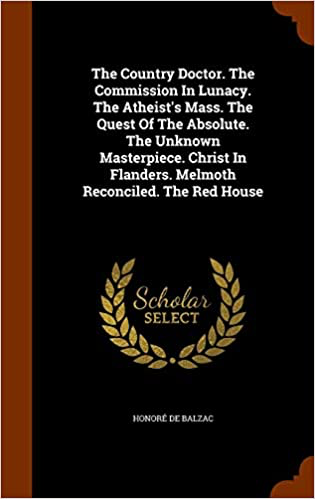
Balzac’s Unknown Masterpiece and Melmoth Reconciled.
I advise you to read these. These are two little masterpieces, full of the most delightful irony.
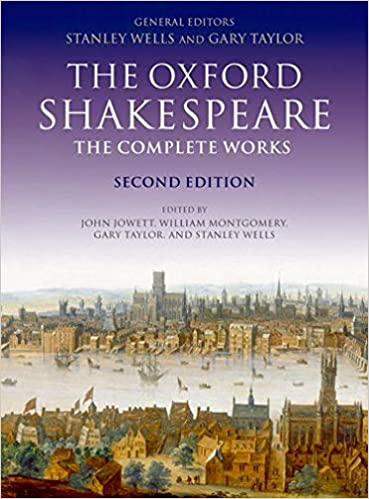
All of William Shakespeare
An honest man and plain, he must speak truth/An they will take it, so; if not, he’s plain./ These kind of knaves I know.
Brilliant.
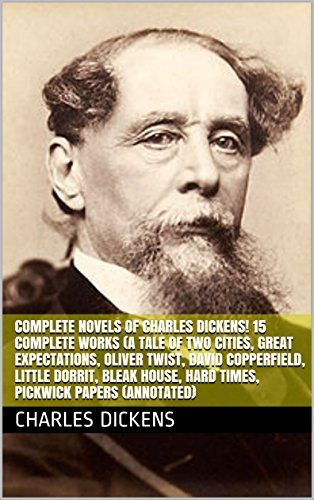
All of Charles Dickens
The present splendid brotherhood of fiction-writers in England have issued more political and social truths than have been uttered by all the professional politicians, publicists and moralists put together, portraying the middle class as full of presumption, affectation, petty tyranny and ignorance - and the civilized world have confirmed their verdict with the damning epigram that it has fixed to this class that 'they are servile to those above and tyrannical to those beneath them.'
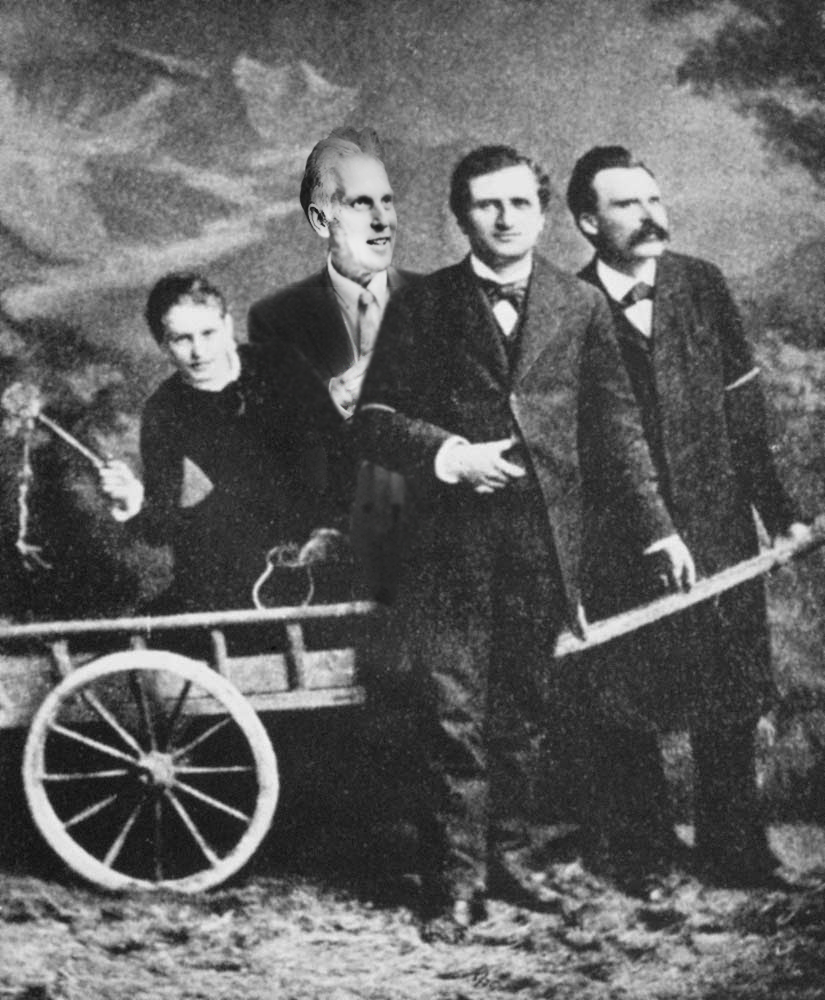
About the Author
Richard Marshall is still biding his time.